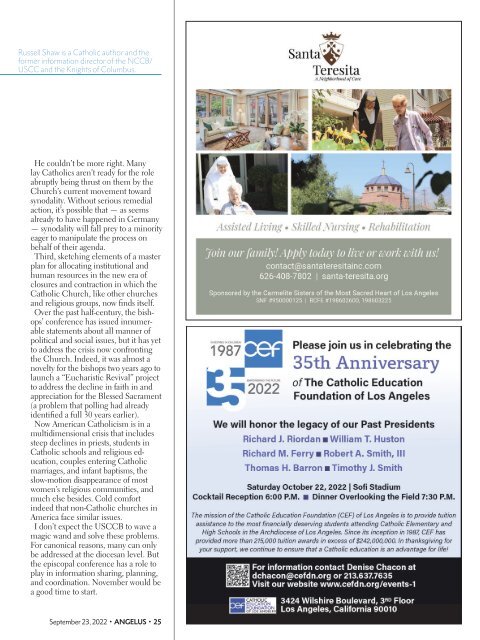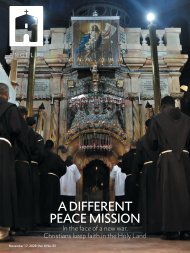Angelus News | September 23, 2022 | Vol. 7 No. 19
On the cover: The logo used for the Catechism of the Catholic Church, published in 1992, is adapted from an image found in the Catacombs of Domitilla in Rome thought to symbolize “the rest and the happiness that the soul of the departed finds in eternal life.” Ahead of the 30th anniversary of the catechism’s release next month, Russell Shaw explains on Page 10 what prompted the Church to undertake such an immense project. On Page 26, Greg Erlandson offers a perspective on the text’s relevance to ordinary Catholics — like his own mother.
On the cover: The logo used for the Catechism of the Catholic Church, published in 1992, is adapted from an image found in the Catacombs of Domitilla in Rome thought to symbolize “the rest and the happiness that the soul of the departed finds in eternal life.” Ahead of the 30th anniversary of the catechism’s release next month, Russell Shaw explains on Page 10 what prompted the Church to undertake such an immense project. On Page 26, Greg Erlandson offers a perspective on the text’s relevance to ordinary Catholics — like his own mother.
Create successful ePaper yourself
Turn your PDF publications into a flip-book with our unique Google optimized e-Paper software.
Russell Shaw is a Catholic author and the<br />
former information director of the NCCB/<br />
USCC and the Knights of Columbus.<br />
He couldn’t be more right. Many<br />
lay Catholics aren’t ready for the role<br />
abruptly being thrust on them by the<br />
Church’s current movement toward<br />
synodality. Without serious remedial<br />
action, it’s possible that — as seems<br />
already to have happened in Germany<br />
— synodality will fall prey to a minority<br />
eager to manipulate the process on<br />
behalf of their agenda.<br />
Third, sketching elements of a master<br />
plan for allocating institutional and<br />
human resources in the new era of<br />
closures and contraction in which the<br />
Catholic Church, like other churches<br />
and religious groups, now finds itself.<br />
Over the past half-century, the bishops’<br />
conference has issued innumerable<br />
statements about all manner of<br />
political and social issues, but it has yet<br />
to address the crisis now confronting<br />
the Church. Indeed, it was almost a<br />
novelty for the bishops two years ago to<br />
launch a “Eucharistic Revival” project<br />
to address the decline in faith in and<br />
appreciation for the Blessed Sacrament<br />
(a problem that polling had already<br />
identified a full 30 years earlier).<br />
<strong>No</strong>w American Catholicism is in a<br />
multidimensional crisis that includes<br />
steep declines in priests, students in<br />
Catholic schools and religious education,<br />
couples entering Catholic<br />
marriages, and infant baptisms, the<br />
slow-motion disappearance of most<br />
women’s religious communities, and<br />
much else besides. Cold comfort<br />
indeed that non-Catholic churches in<br />
America face similar issues.<br />
I don’t expect the USCCB to wave a<br />
magic wand and solve these problems.<br />
For canonical reasons, many can only<br />
be addressed at the diocesan level. But<br />
the episcopal conference has a role to<br />
play in information sharing, planning,<br />
and coordination. <strong>No</strong>vember would be<br />
a good time to start.<br />
It was 2020, and the world suddenly<br />
lost its bustle. Isolated from the<br />
workplace and other social contact,<br />
we were left with ourselves, and none<br />
of our distractions seemed adequate to<br />
the task of amusing us. We were ready<br />
to learn how to think.<br />
It was 2020, and the world suddenly<br />
lost its bustle. Isolated from the<br />
workplace and other social contact,<br />
we were left with ourselves, and none<br />
of our distractions seemed adequate to<br />
the task of amusing us. We were ready<br />
to learn how to think.<br />
Mike Aquilina is a contributing<br />
editor to <strong>Angelus</strong> and author of many<br />
books, most recently “Friendship and<br />
the Fathers: How the Early Church<br />
Evangelized” (Emmaus Road Publishing,<br />
$22.95).<br />
<strong>September</strong> <strong>23</strong>, <strong>2022</strong> • ANGELUS • 25


















